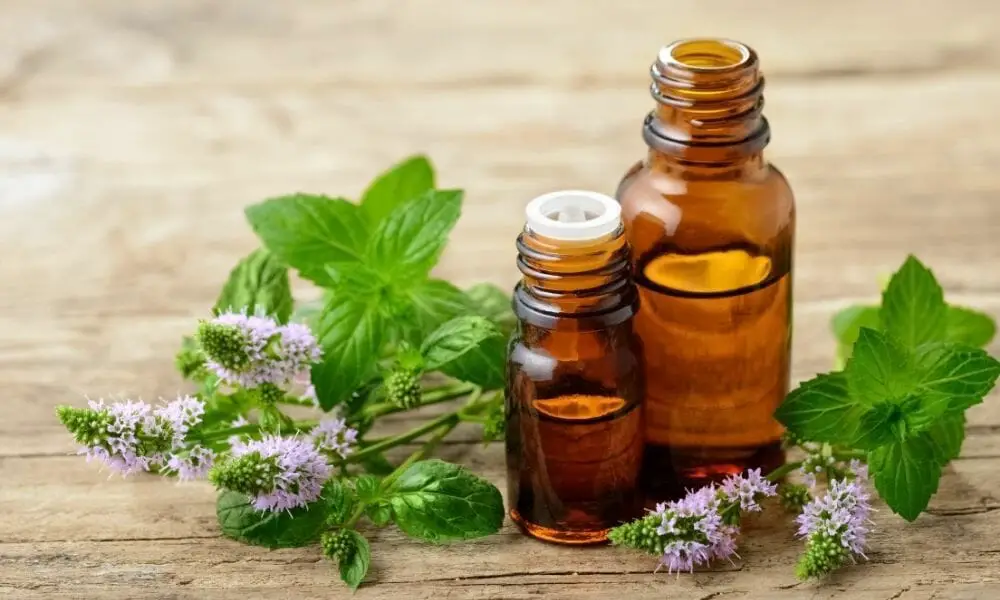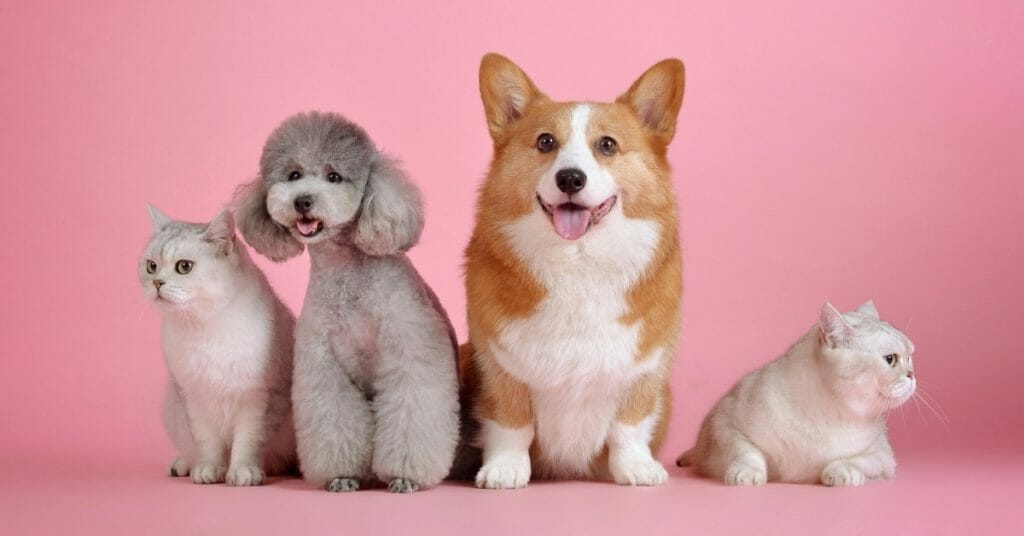Essential oils and pets sounds like a weird combination. But you’ll be joyfully surprised at the results they can garner. Some pets have a lot of health problems.
It’s not about the breed or even the owner; it’s simply up to luck sometimes. And essential oils for these pets can bring some significant relief.
Let me tell you my story first. If you’re not interested, you can use the table of contents to skip down to the oils themselves. But it will give you some extra context as to whether essential oils are safe for pets.
By the way, if you’re looking to use essential oils on yourself or your loved ones, be sure to check our mega guide on essential oils and their uses.
My Story
I once had a dog that had problems with anxiety, bladder control, fleas, dry skin, and constipation which alternated with diarrhea. Not a comfortable life. For either of us.
So after a lot of research and talking to people with pets that have similar problems. People who were continually trying over the counter medicines and products to relieve or fix the issues. I realized they were getting no results, or even worse; the conditions were worsening!
Pet Products & Pet Health
Always read labels; there are warnings and cautions and toxic ingredients in most pet products.
I did lots of google searches and found thousands of complaints about dog foods and products that caused many kinds of issues, including lack of bladder control, anxiety, seizures, arthritis, and even death in dogs, cats, and other pets and animals.
Well, it’s no surprise as when I looked at the label of ingredients, even in the “natural” pet foods and products, I found many toxins, chemicals and food coloring/dyes that are toxic to living things.

It’s not surprising then that more and more pets are getting sick and having an increased chance of dying from cancer. There was a time, not too long ago, where it was very rare for pets to die of cancer!
I knew that even dog food, shampoos, bug repellents, flea killers, and everything I used affected my dog’s mental and physical health.
And apparently, he didn’t need to go to a vet and get on prescription medicine for his leaking bladder and anxiety.
In Comes Essential Oils
He needed lavender oil to help him calm down, Frankincense to tone his bladder, and coconut oil to improve the health of his brain, organs, skin, and blood pressure.
And he needed other essential oils for nutrients, plant phytochemicals, and antioxidants. He needed to eat similar foods that we eat, such as organic meats and vegetables. After all, he is a living thing.
He no longer has to sleep on a plastic pad. And I no longer have to clean up nasty urine stains and smells.
Beyond just my own success using essential oils for my pet, many other people and doctors have found them to be extremely helpful and beneficial to their pet’s health.
Dr. Richard Palmquist has the following to say about essential oils and your dog in Dogs Naturally Magazine:
“Oils have been shown to have many desirable effects such as reducing anxiety and inflammation, fighting oxidative processes, battling toxins and fighting infections by inhibiting bacteria, fungi and viruses. Oil odors can also be used to affect mental states and memory. Modern doctors are looking for agents that will assist in management of resistant infections and cancer, and these natural products may well hold the key to several major advancements.”
Essential Oils For Pets
Here are a few of the very best essential oils for pets that you can use to improve your pet’s health. You’ll be giving him/her nutrients that they can’t get otherwise. These essential oils will also cut down on the cost of medications or future vet visits as they will ward off insects and parasites.
Frankincense Essential Oil

Frankincense is one of the most amazing essential oils because it literally works on a cellular level to kill bacteria. My dog had anxiety issues, and many times he’d cry, whine, or bark for no reason.
He also peed on the spot many times when he was nervous or even the least bit excited. These are common problems, especially for puppies and smaller dogs, that a few drops of Frankincense essential oil rubbed into the belly and spine can fix.
Also, applying this oil over the area of concern, such as in my case; his bladder, helps to strengthen and firm up the skin and bladder.
This oil, mentioned in the Bible many times (meaning it is 100% natural and stood the test of time), will help your high-strung dog to feel more comfortable naturally without any chemicals.
Studies also show that Frankincense fights cancer in both humans and animals.
Frankincense (like many other pet-friendly oils) should be diluted at a 1:10 ratio with olive oil or coconut oil before applying to your pet’s skin.
Lavender Essential Oil

Lavender is a universal oil that you can use either pure or diluted. It’s useful in conditioning your pets to a new space if they’re especially nervous.
It will also help with allergies, bites, rashes, burns, ulcers, insomnia, car ride anxiety, and car sickness, to name a few.
Lavender is excellent for cleaning your pet’s ears when diluted. Try 4-5 drops on a cotton ball and wipe the inside of the ears. Inside meaning lifting the ear flap and wiping around, not going inside the ear cavity.
Dirty ears on a dog are among the main causes of more serious, expensive, and even deadly infections and health issues.
Together, let’s elevate the art of shaving and embrace the soothing embrace of post-shave oils! Check out our latest blog The Ultimate Guide To Oils For After Shaving: Achieve a Smooth and Nourished Skin to know more.
Chamomile Essential Oil

It offers similar health benefits as lavender. These two essential oils are very safe for pets and even infants and babies as they’re incredibly gentle.
Some animals prefer one aroma over the other—many like them both. Use chamomile to relax your pet by giving him/her a massage.
Peppermint Essential Oil

You already know the all-too-familiar refreshing smell. So not only will peppermint make your pet smell fresh as gum, it actually gets rid of fleas and other insects quite effectively.
Other than that, it’s also said to cool sore muscles, soothe upset stomachs, and energize tired pets. Also, if you add a few drops to your diffuser, it can improve your dog’s respiratory health (and yours).
Just make sure to dilute it in a 1:50 ratio, as peppermint oil is pretty potent.
Coconut Oil

I’m going a bit off-topic here as coconut oil is not exactly an essential oil (although it’s great for mixing with other essential oils). But coconut is a miracle food/oil.
From healing dry skin and mange to making sure your pet’s blood pressure is regulated. It can be applied directly on the fur and skin as well as ingested.
Just place a bit of the organic oil in your dog’s food or water. Many animals will eat or drink it directly as they’re quite fond of the smell and taste.
African Shea Butter + Coconut Oil
This oil combination is perfect for treating extreme dryness, skin problems, and skin disorders in pets.
While coconut oil just soaks right into the skin and goes into the bloodstream (to deliver its health benefits). The skin may still be too dry and in need of protection.
By using African shea butter and coconut oil, your pet will get instant relief from rashes, heat rashes, hot spots, dryness, and much more.
Other Essential Oils Safe For Pets
Here are some other essential oils that are generally safe for pets. But always make sure to check the case for your specific pet and the proper dilution rate.
- Myrrh
- Ginger
- Copaiba
- Helichrysum
- Peppermint
- Lavender
- Chamomile
- Frankincense
Essential Oils Bad For Pets
These are the essential oils that should be completely avoided.
- Basil
- Cinnamon Bark
- Clove
- Laurus Nobilis
- Melaleuca Quinquenervia
- Mountain Savory
- Oregano
- Tea Tree
- Thyme
- Wintergreen
Essential Oils And Pets Guidelines
Here are a few guidelines to follow if you decided to use essential oils on your pet.
- Avoid using essential oils on pets younger than 8 weeks.
- Always check the proper dilution rate of each oil. Some are ok alone. Some need only 1 drop for every 10 of carrier oil. And some need 1 for every 50.
- Be careful not to get essential oils in your pet’s eyes, nostrils, inner ear, or open wounds.
- Observe your pet. Everyone is different and yours might not like or react well to essential oils. Observe and continue accordingly.
